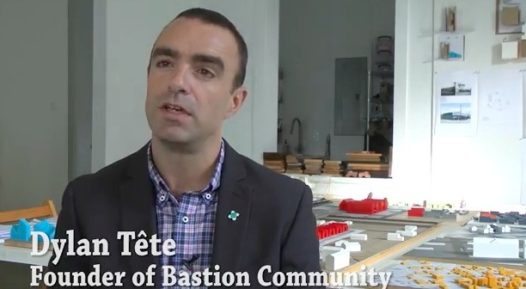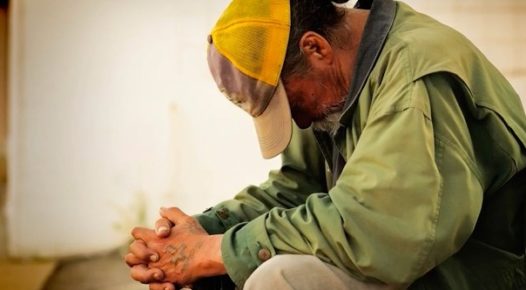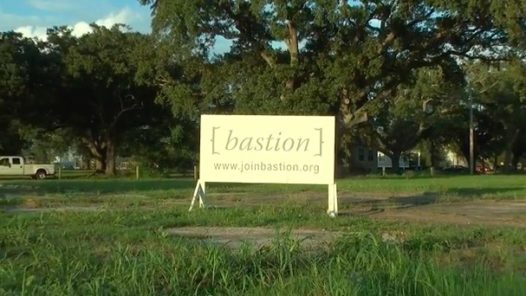
Bastion founder Dylan Tete (Photos by Steve Juliff)
Going to war takes courage. Sometimes coming home takes the same. U.S. combat veterans who have survived life-threatening injuries can find the transition from hot zone to home life a difficult one. In New Orleans, an organization called Bastion is offering a hand. We recently sat down with Bastion founder and executive director Dylan Tete to talk about the innovative community that he is building in Gentilly for wounded veterans and their families.
Tell us what Bastion is.
To the naked eye, Bastion is 39 double family homes, so 78 residential units scattered on a 5 1/2 acre property with a great lawn for recreation and a wellness center for health and education programing. But what is maybe less obvious is the life and the purpose and the warrior ethos that permeates Bastion. Bastion as an intervention is addressing injuries like traumatic brain injury.
What we’re doing is more or less recreating the military family. If you consider a warrior who stood shoulder to shoulder with someone, depending on them for their safety and vice versa, and then medically evacuate them off the battle field, they wake up in a hospital and they’re discharged after post acute care, that in of itself is a type of loss, a traumatic loss. By cohousing people of similar backgrounds … that sense of service doesn’t have to end. That service to your community never ends, and so that’s the kind of spirit that we bake into the housing program.

Bastion is a New Orleans community for veterans and volunteers. (Photos by Steve Juliff)
My understanding is that it’s not just for military families. You have a volunteer component as well?
You may have heard about the military civilian divide. There was a time in our country when 25 percent of our society service was in uniform. That ratio has diminished over the decades. Now there’s less than 1 percent who have served since 9/11, and so there is this kind of rift between military and civilian society. We don’t understand each other; there’s a gap there and so we’re bridging that military civilian divide. We invite anyone who wants to give us six hours of service every week to support the warrior and their family, whether that’s in the instrumental activities of daily living, so things like transportation, meal prep, helping someone who may have a brain injury deescalate and prevent some sort of further injury. We invite those people to come and live next door, and that, again, is going back to the model for intentional community.
You’re a West Point graduate, you have a Master’s Degree in Public Health, you have experience in construction, plus you served in Iraq. So that gives you some real insight into both the need and the solution.
Well, you hit on it in your opening remarks about courage. Yes, I was all of those things, and I thought I understood what courage was. And then I returned home, I struggled with my demons and I found myself in Colorado at an outdoor adventure camp for kids who lost their dads in Iraq and Afghanistan, so this gold star camp for gold star families. Anyway, those kids taught me a new expression of courage, which is the courage to live on, because you see I, at my worst, at my bottom, I had given up and I wanted to end my life. That’s when I checked into the VA and got the help that I needed.
I went there thinking, oh, these poor kids, let’s help them out, they just lost their father and what I didn’t realize was the healing that occurred to me in giving service, so that was an important lesson to take away: Service can be a modality on its own for healing.

The five-acre site sits across from the London Avenue Canal breach in Hurricane Katrina. (Photos by Steve Juliff)
I think a lot of us learned that from Hurricane Katrina.
Yes, ironically, I literally walked out of Iraq at the end of ‘04, scooped up my wife and my newborn son who I had just met and we moved here three months before Katrina, which I guess on one side it was perfect timing. I knew exactly what to do.
Everything I’ve done has been an effort to make the city the greatest city on earth. If you look at our property, there aren’t very many 5-acre vacant properties in New Orleans, but ours sits right across the street from the London Avenue Canal, where it breached, the actual breach point. And so, this is a neighborhood that has struggled a bit to come back, and we’re investing $17 million into this neighborhood that will bring back new life. I’ve always looked at Bastion as a way of continuing my service with my fellow veterans, but then also rebuilding New Orleans.
What gave you the idea?
Five years ago, before traumatic brain injury was a sort of household common use term, I had friends who were coming back and some of them were not diagnosed, or they weren’t diagnosed properly. I took a trip to Walter Reed National Military Medical Center in Bethesda; I met a doctor there named Williamson who was the TBI in-patient director and he said, Dylan, this is where the need is.
it’s a tremendous burden on the family, if they’re lucky to have a family. Imagine a 20-something-year-old living in a nursing home. I just thought, well, we have to do something. There’s got to be a better alternative. And to this day no one else has yet to offer a military family an alternative to skilled nursing or assisted living or just backed-in services into the home.
This community is even architecturally designed with this need foremost.
It has taken us 5 years to get to this point, and we have 5 households living at Bastion right. So, we’ve had plenty of time to learn about physical design and how that can shape your disposition, your attitude, how it can foster a sense of belonging and connectedness and how it could improve your health.
So instead of street-facing doors, we turn them inside and clustered four units together, so you’re maximizing collisions in a good way. You want to facilitate active engagement that can incubate meaningful relationships to endure for a lifetime. When you wake up and you feel terrible, or you feel like you want to end it, go ahead and make the call to your doctor, you might have to wait 30 days. But instead of other negative behaviors, why don’t you just walk out of your front door and talk to your neighbor? And so it’s baked into the design, in the physical design, into the model.
And this is designed to be a prototype for other communities. I don’t think there’s anything quite like it anywhere in the country.
We are America’s first intentional community for warriors. We adapted a model from Generations of Hope, which is a wonderful organization. They’ve helped dozens of grass-root organizations like Bastion get started. Their origin was foster youth and adoptive families, so there are generations of Hope Communities and we are a Generation of Hope Community that exists around another type of population. We built the first one here in New Orleans for warriors and families and we do intend to replicate.
How far along are you in your implementation?
As units come online, as they complete construction and we receive them, we’ll be able to move in families, so we’re thinking of batches of about three to five households every month through the end of summer.
And how do you qualify for this housing?
We leveraged affordable housing tax credits to get it built, so you do have to income qualify. But really if you’re a military veteran, especially any veteran who served after 9/11 and you need a Bastion or you want to serve with other like-minded individuals to make not only our greater community, but the city of New Orleans, a great place to live again, then they can reach out to us and apply.
Give us a story of one person who lives in the complex or is moving into the complex.
Okay, so let me tell you about our very first resident who we moved in, in January. I met Rick through anther veterans service organization called The Mission Continues. He was living in his truck in New York; it wasn’t working out over there. I think he had $300 left in his checking account. This is someone with tremendous talent, tremendous skills, served his country in Iraq and was homeless. He found a platoon mate of his who was living here in New Orleans in a not so safe part of town, and so kind of bunked up with him until he completed his application. Our property manager, Latter and Blum, was insistent they wanted to hire a veteran to be the property manager of Bastion, so we sent them Rick’s resume; they hired him. So he’s not only our first resident, but our property manager as well. And I think Rick and I are very similar in that our injuries are not so visible. There are invisible injuries as a result of serving in combat and then just trying to reintegrate back into society. In my antidotal assessment, Rick’s life has been transformed.
How big is the problem?
Rand estimates there are about 400,000 service members who have experienced a traumatic brain injury since 9/11, so that’s the global population. Over here we do know from from data collected at the local VA level that there is plenty of need here in southeast Louisiana. The problem is compounded in a sense that, while penetrating injuries are very [obvious], you’re not going to mistake that for post traumatic stress, right? I have a good friend who survived multiple blast exposures, enclosed contact with very loud, very big bombs — passing out in the fight and regaining consciousness and going back into the fight and then years later discovering that they have developed the same symptoms as someone with a penetrating injury, things like memory loss, the loss of executive function, cognitive impairments, and so that’s a challenge too. There are those who have slipped through the cracks and need to continue with care and that’s why Bastion exists.
Has this been therapeutic for you, doing this?
Yes. It has fulfilled a large vacuum. I guess you might say a large hole in my life.
Did you think ever thing you’d get this far?
Yes, I did, Renee. I saw this day five years ago. You know failure is not an option in my cohort, and I absolutely would not have stopped until it was done.
To learn more about Bastion, go to joinbastion.org.
 NOLAbeings Multimedia artist Claire Bangser created NOLAbeings as a portrait-based story project that marries...
NOLAbeings Multimedia artist Claire Bangser created NOLAbeings as a portrait-based story project that marries...  Voodoo in New Orleans: Reviving history: New Orleans fortune telling This article takes a deep dive into the history of Voodoo in New Orleans, its hybridization with Catholicism, and its present-day place in the city's culture. The author visits fortune-tellers in the French Quarter, using their guidance as a tool for introspection rather than a deterministic predictor of the future. Through her experiences in New Orleans, the author feels a mystical connection to both the past and the future.
Voodoo in New Orleans: Reviving history: New Orleans fortune telling This article takes a deep dive into the history of Voodoo in New Orleans, its hybridization with Catholicism, and its present-day place in the city's culture. The author visits fortune-tellers in the French Quarter, using their guidance as a tool for introspection rather than a deterministic predictor of the future. Through her experiences in New Orleans, the author feels a mystical connection to both the past and the future. 